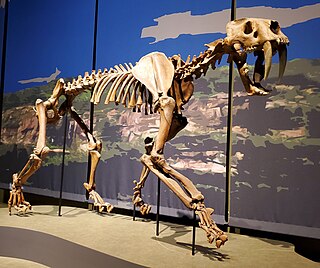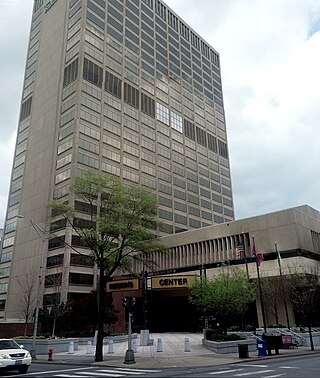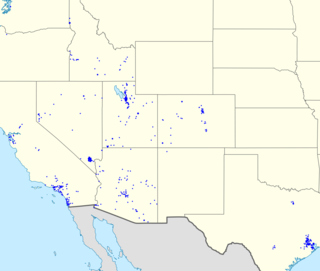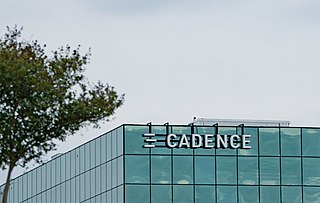
The Nashville Predators are a professional ice hockey team based in Nashville, Tennessee. The Predators compete in the National Hockey League (NHL) as a member of the Central Division in the Western Conference, and have played their home games at Bridgestone Arena since 1998. Their television broadcasting rights are held by Bally Sports South, and the Nashville Predators Radio Network flagship station is WPRT-FM. The Predators are currently affiliated with two minor league teams: the Milwaukee Admirals of the American Hockey League (AHL), and the Atlanta Gladiators of the ECHL.

Smilodon is an extinct genus of felids. It is one of the best known saber-toothed predators and prehistoric mammals. Although commonly known as the saber-toothed tiger, it was not closely related to the tiger or other modern cats, belonging to the extinct subfamily Machairodontinae, with an estimated date of divergence from the ancestor of living cats around 20 million years ago. Smilodon was one of the last surviving machairodonts alongside the distantly related Homotherium. Smilodon lived in the Americas during the Pleistocene epoch. The genus was named in 1842 based on fossils from Brazil; the generic name means "scalpel" or "two-edged knife" combined with "tooth". Three species are recognized today: S. gracilis, S. fatalis, and S. populator. The two latter species were probably descended from S. gracilis, which itself probably evolved from Megantereon. The hundreds of specimens obtained from the La Brea Tar Pits in Los Angeles constitute the largest collection of Smilodon fossils.

UBS Tower is a 108-meter (354-foot), 28-story skyscraper at 315 Deaderick Street in Nashville, Tennessee.

Robert Bruce Ferguson was an American country music songwriter and record producer who was instrumental in establishing Nashville, Tennessee as a center of country music. He was also a movie producer, and Choctaw Indian historian. Ferguson is best known for writing the bestselling songs "On the Wings of a Dove" and "The Carroll County Accident". The "Carroll County Accident" won the Country Music Association Song of the Year in 1969. In 1983 "Wings of a Dove" was featured in the movie Tender Mercies starring Robert Duvall. In 1987, Broadcast Music Incorporated (BMI) awarded Ferguson with the "million air" plays for the "Wings of a Dove."
AmSouth Bancorporation was a banking company headquartered in Birmingham, Alabama, and operated for its final year in existence as a bank holding company (subsidiary) of Regions Financial Corporation after a merger between the two banks. AmSouth was previously known as First National Bank of Birmingham, which was first organized by Charles Linn in 1872. AmSouth was in the financial services industry and at its peak employed over twelve thousand people.
SouthTrust Corporation was a banking company headquartered in Birmingham, Alabama. In 2004, SouthTrust reached an agreement to merge with Wachovia in a stock-for-stock deal. At the time of the merger with Wachovia was completed, SouthTrust had $53 Billion in assets. SouthTrust was listed on the NASDAQ exchange under the ticker symbol SOTR. The company was headquartered in the SouthTrust Tower, now known as the Shipt Tower. SouthTrust had branches in Alabama, Florida, Georgia, Mississippi, North Carolina, South Carolina, Tennessee, Texas and Virginia. By the end of 2005, all former SouthTrust branches that remained open carried the Wachovia name.

Regions Financial Corporation is an American bank holding company headquartered in the Regions Center in Birmingham, Alabama. The company provides retail and commercial banking, trust, stock brokerage, and mortgage services. Its banking subsidiary, Regions Bank, operates about 2,000 automated teller machines and 1,300 branches in 15 states in the Southern and Midwestern United States.
First American Bank may refer to several independent banks in the United States:
Firstar Corporation was a Milwaukee, Wisconsin-based regional bank holding company that existed from 1853 to 2001. In 2001, Firstar acquired U.S. Bancorp and assumed its name, moving its headquarters to Minneapolis.

Zions Bancorporation is a national bank headquartered in Salt Lake City, Utah. It operates as a national bank rather than as a bank holding company and does business under the following seven brands: Zions Bank, Amegy Bank of Texas, California Bank and Trust, National Bank of Arizona, Nevada State Bank, Vectra Bank Colorado, and the Commerce Bank of Washington. It has 416 branches and over 1 million customers. It was founded by the Church of Jesus Christ of Latter-day Saints in 1873, although the church divested its interest in the bank in 1960.
Mercantile Bancorporation was the largest bank holding company in Missouri when it was acquired by Firstar Corporation in 1999.

Rainier Bancorporation was the Seattle-based parent corporation of Rainier National Bank, a Washington state bank with branches throughout the state. Rainier traced its roots back to the National Bank of Commerce, which was founded by Richard Holyoke in 1889. The name Rainier National Bank was adopted in 1974. Rainier Bancorp expanded into Alaska with the purchase of Anchorage's People's Bank & Trust in 1983 and into Oregon with the purchase of Gresham's Mount Hood Security Bank in 1986, expanding further in Oregon in 1986 with the government-assisted purchase of Portland's failed Lincoln Savings & Loan Association.
Union Planters Bank was a United States financial institution and multi-state bank holding corporation headquartered in Memphis, Tennessee prior to being acquired by Regions Financial Corporation. With over $34 billion in assets, Union Planters Bank was the largest bank in Tennessee and among the 30 largest bank holding companies in the United States. Union Planters operated over 760 banking centers in the states of Alabama, Arkansas, Florida, Illinois, Indiana, Iowa, Kentucky, Louisiana, Mississippi, Missouri, Tennessee, and Texas.
Jackson W. Moore is an American attorney and a former executive chairman of Union Planters Bank and Regions Financial Corporation.

Cadence Bank is a commercial bank with dual headquarters in Tupelo, Mississippi, and Houston, Texas, with operations in Alabama, Arkansas, Florida, Georgia, Louisiana, Mississippi, Missouri, Oklahoma, Tennessee, Texas, and Illinois. In 1876, Raymond Trice and Company received a charter to create a bank in its hardware store in Verona, Mississippi. In 1886, the banking operation was moved to Tupelo, Mississippi and the company was renamed to Bank of Lee County, Mississippi. Soon after, it was renamed to the Bank of Tupelo. The bank was renamed to Bank of Mississippi in 1966. In 1997, the bank changed its name to BancorpSouth. In October 2021, the bank changed its name to Cadence Bank. It has the naming rights to Cadence Bank Amphitheatre in Atlanta and Cadence Bank Arena in Tupelo.

United Community Banks, Inc. is an American bank. United is one of the largest full-service financial institutions in the Southeast, with $27.3 billion in assets, and 203 offices in Alabama, Florida, Georgia, North Carolina, South Carolina and Tennessee.

The First American Cave is an archaeological and paleontological site in downtown Nashville, Davidson County, Tennessee. The site was initially recognized in 1971 during construction of the foundations for the First American National Bank building at 315 Deaderick Street, when workers noticed a collection of bones being unearthed within a pocket of dirt approximately 30 feet below ground surface. Excavations were halted and both the Vanderbilt University Department of Anthropology and the Southeastern Indian Antiquities Survey were notified of the find. It was subsequently determined that the bones included those of humans, as well as a number of animal species, including a saber-tooth cat. The dirt pocket from which the bones had been disinterred was in fact a filled in cave, most of which had been destroyed by construction. The Southeastern Indian Antiquities Survey was given permission to excavate within the remaining portion of the cave with the assistance of Vanderbilt University students.
National Bank of Commerce was an American bank headquartered in Memphis, Tennessee until it was taken over by SunTrust Banks in 2005.

Cadence Bank was a US-based bank with 99 branches in Alabama, Florida, Georgia, Mississippi, Tennessee and Texas. The bank was based in Atlanta, with executive and operations headquarters in Birmingham, Alabama. It was the primary subsidiary of Houston, Texas based Cadence Bancorporation, a bank holding company.
Dennis C. Bottorff is an American businessman, banker and philanthropist. As chairman and chief executive officer of the First American Corporation, he was responsible for its merger with the AmSouth Bancorporation. He served as the chairman of the Tennessee Valley Authority from 2010 to 2012. He is the co-founder and general partner of Council Capital, a private equity and venture capital firm based in Nashville, Tennessee. He is also the co-founder and the chairman of CapStar Bank.











